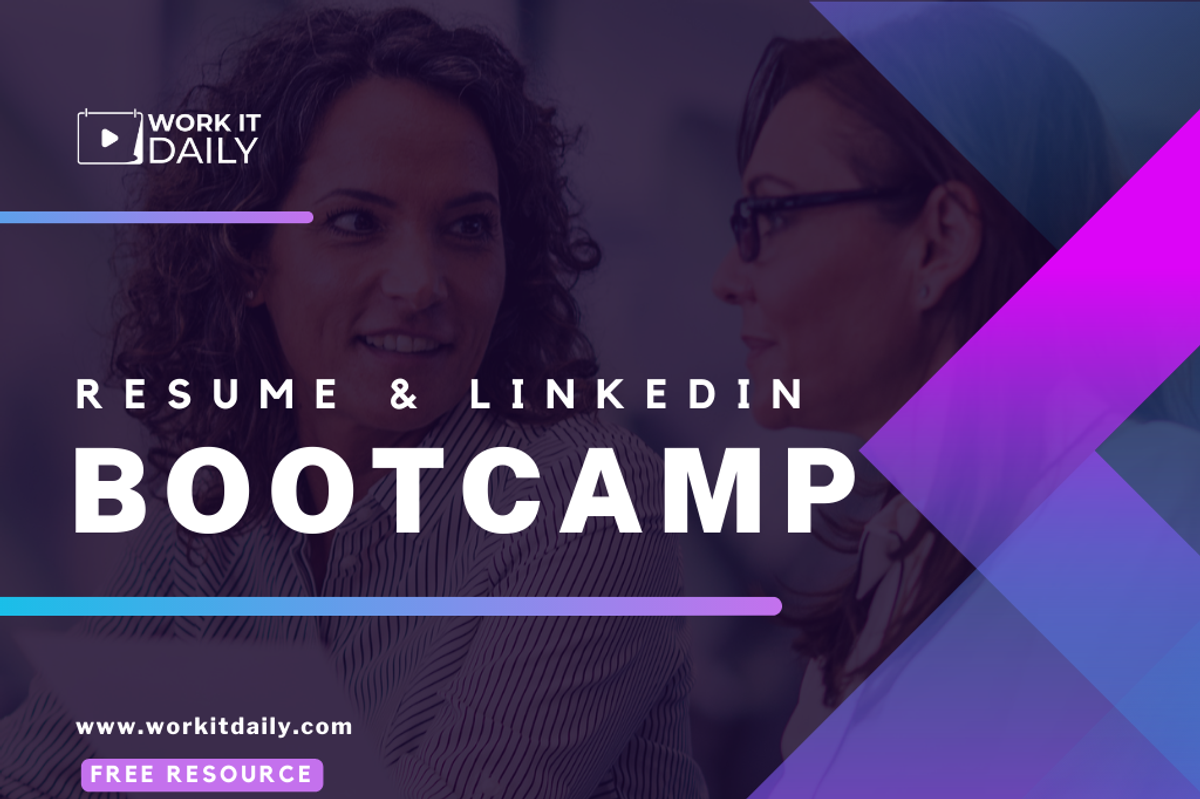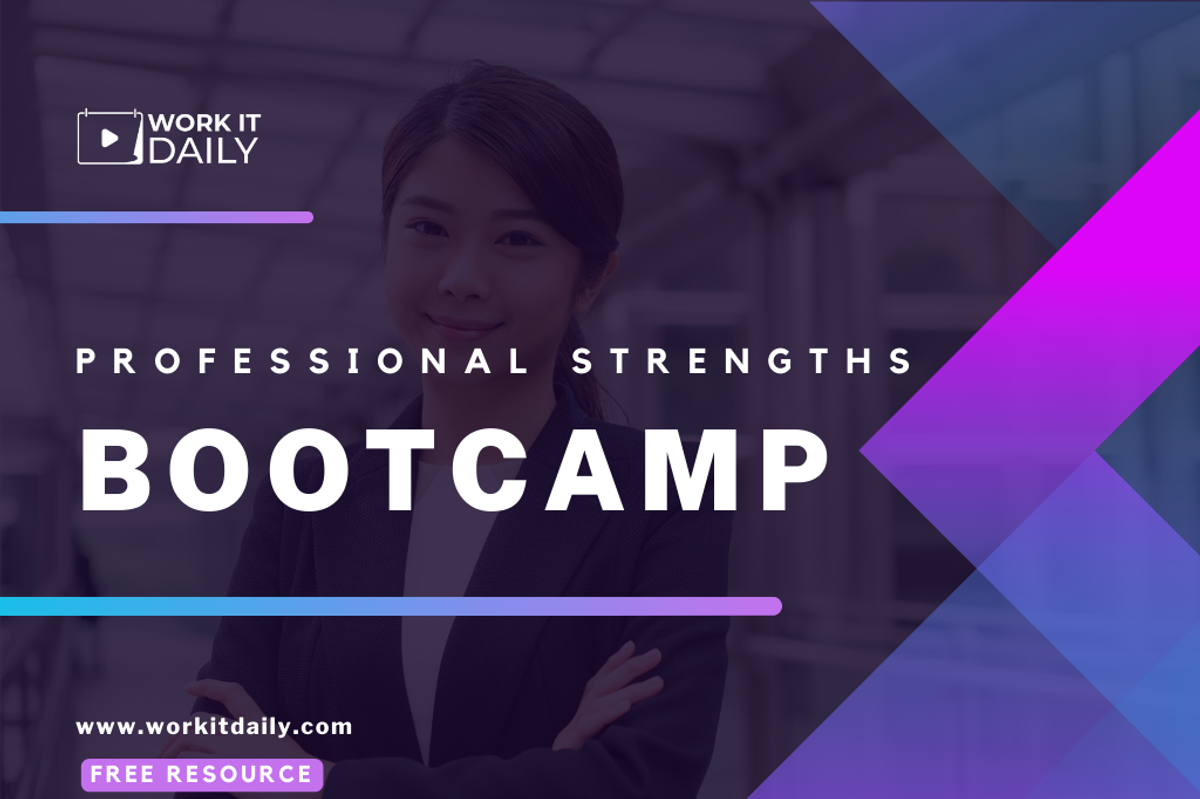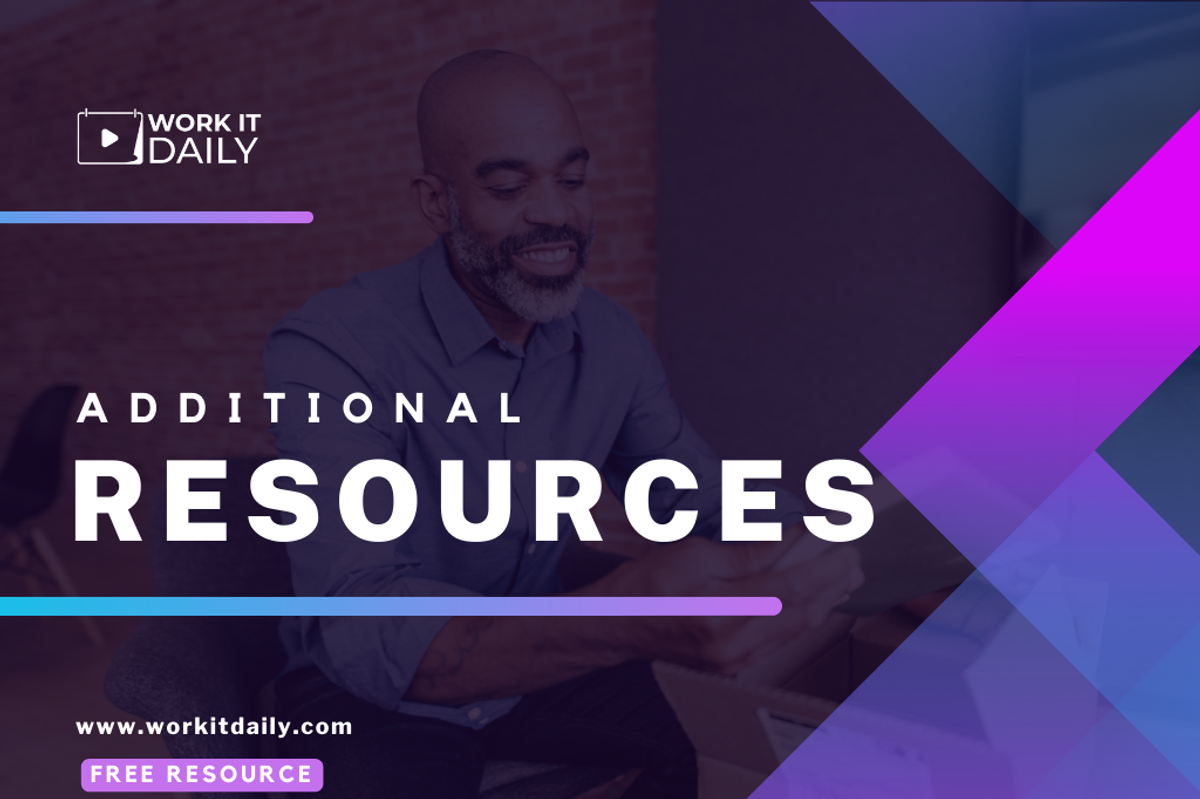
Work It Daily has an amazing library of free resources for professionals at any age or job level. No matter if you’re looking for help with your job search, career change, or professional development efforts, Work It Daily has the career resources you need.
Here are Work It Daily’s top six free career resources, plus a few additional resources you might find helpful:
1. Resume & LinkedIn Bootcamp

Today, if you want recruiters to call you, your resume and LinkedIn profile need to stand out.
Our Resume & LinkedIn Bootcamp is a free workshop hosted by J.T. O’Donnell, founder & CEO of Work It Daily, and Christina Burgio, Director of Training Development & Development, that can help you write and optimize your resume and LinkedIn profile to get noticed by recruiters.
In this free bootcamp, you’ll learn:
- What recruiters want your resume to look like
- How to make sure your LinkedIn profile is optimized
- Tips for making sure BOTH tools are set up correctly
2. Career Decoder Quiz

Are you ready to take the first step toward unlocking your true professional potential?
The Career Decoder Quiz will help you determine what your workplace persona is. That means you’ll get a sense of who you are as a working professional and what makes you thrive at work. You’ll find out how you like to create value and what your professional strengths are, which will help you find the right career for you.
Knowing who you are as a working professional and what makes you happy on the job will help you be successful in your career or job search.
Don’t waste another day not knowing your professional strengths.
Take our Career Decoder Quiz today!
3. Workplace Communication Style Quiz

Have you ever wondered about how you communicate with others?
How you interact with others plays a major role in both your career and life in general. It can be hard to categorize yourself, but it’s extremely helpful to have an idea of how you communicate with others and get a sense of how others perceive you.
The Communication Style (ISAT) Quiz allows you to understand your communication style so you can work more effectively with others. It has 18 questions about your personality and how you handle certain situations.
Take our Workplace Communication Style Quiz today!
4. How To Choose Your Career (In 5 Simple Steps)

Do you feel stuck in your career and don’t know what to do next? You are not the problem. Thousands of people (just like you!) feel professionally stuck because school never taught us what career best suits our needs.
In this 60-minute workshop, J.T. O’Donnell, founder & CEO of Work It Daily, and Christina Burgio, Director of Training Development & Development, break down step by step how to choose a career that suits your unique combination of professional strengths.
Here’s what you’ll learn:
- How to choose your next career path
- Why working “in” your job is hurting your career
- How your unique personality is impacting your success
- How to determine which strengths to use to build your dream career
- And so much MORE!
Get instant access to “How To Choose Your Career (In 5 Simple Steps)” today!
5. Professional Strengths Bootcamp

Understanding who you are as a worker is the key to achieving career satisfaction.
Our Professional Strengths Bootcamp is a free workshop hosted by J.T. O’Donnell, founder & CEO of Work It Daily, and Christina Burgio, Director of Training Development & Development, designed to help you learn how to unlock your professional strengths so you can get what you want from work.
Here’s what you’ll learn:
- Why working “in” your job is hurting your career
- How your unique personality is impacting your success
- How to determine which strengths to use to build your dream career
- And so much MORE!
6. How To Break Through Career Burnout

Want to learn how to get unstuck and feel happy in your career again?
In this 60-minute workshop, J.T. O’Donnell, founder & CEO of Work It Daily, and Christina Burgio, Director of Training Development & Development, will teach you why burnout occurs and what you can do to motivate yourself to get back on track so you can regain the professional happiness and satisfaction you want and deserve.
Here’s what you’ll learn:
- How burnout occurs and why it’s so common
- The path you’ll want to take to overcome burnout
- What high-payoff activities will make you successful
- The steps you’ll need to take to get the right results
Get instant access to “How To Break Through Career Burnout” today!
Additional Free Resources

7 Mistakes You Can’t Afford To Make On LinkedIn
In this free training, you will learn:
- The 7 mistakes executives can’t afford to make on LinkedIn anymore
- How to avoid looking like a narcissist on LinkedIn
- The one change in your LinkedIn settings that will get you more profile views
- How “curating” the content you share on LinkedIn impacts your reputation
- The 3 places on your LinkedIn profile you need to care about the most
No. 1 Way To Get A Job Without Applying Online
In this free training, you will learn:
- Why an “interview bucket list” is the secret weapon to securing a good job
- Which tools you need to update and use to get noticed by recruiters
- The right way to network on sites like LinkedIn to get in front of hiring managers
8 Reasons TikTok Will Be The Hottest Way To Hire (And Get Hired) In 2023
In this free training, you will learn:
- Why not just Gen Z but all generations are finding their next employer on TikTok
- How using TikTok will make it easier (yes, easier!) for companies to recruit on other social media platforms like LinkedIn, Instagram, Facebook, and Twitter
- How talent searches for employers on TikTok and “discovers” the best places to work nobody knows about
- How companies will use TikTok to recruit without having to start a company TikTok account
Get instant access to “8 Reasons TikTok Will Be The Hottest Way To Hire (And Get Hired) In 2023” today!
Want More Help With Your Job Search & Career?Â
Sign up for our Daily Newsletter or check out our Premium Resources today!














































